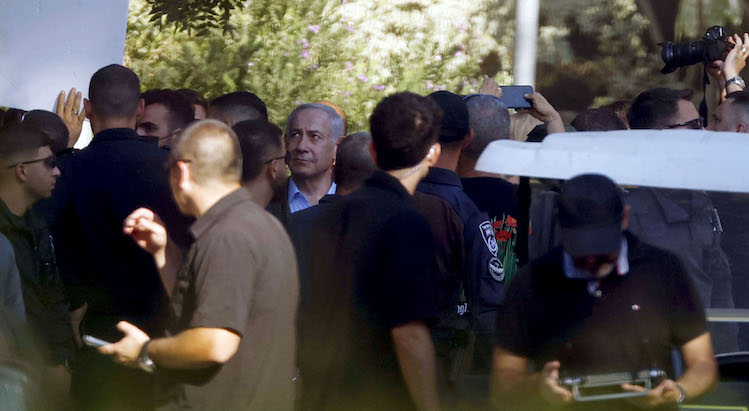Today Israelis saw the most serious indication yet that the war in Gaza—Israel’s longest—may soon draw to a close: Prime Minister Benjamin Netanyahu visited Kibbutz Nir Oz.
Bibi has made appearances at several of the hard-hit communities victimized by Hamas on Oct. 7, 2023. But as most of the headlines about his trip today emphasize, it has taken him 636 days to make his way to Nir Oz. That delay has been criticized heavily by the Israeli public, to say nothing of the residents of the kibbutz. But Netanyahu was always going to have to go to Nir Oz before the end of the war. The current cease-fire negotiations suggest he might believe he was running out chances.
Why is this cease-fire different from all other cease-fires? One answer is the telegraphing of its perceived significance to President Trump. Netanyahu is coming to Washington next week to meet with the president, and Trump has made it clear he wants to be able to announce the cease-fire during that visit.
Trump has also focused on reassuring Hamas (and Qatar) that he will restrain Israel from renewing hostilities as long as negotiations are taking place for further stages in the cease-fire. That would be typical Trump: back Israel’s show of force in Iran, have the U.S. join in for the final bombing run, then show up his isolationist critics by demonstrating that he has not pulled the U.S. into a war with Iran and that the U.S. still calls the shots abroad.
Trump’s success in dictating recent events—even going so far as to tell Netanyahu to order his Air Force pilots to turn their planes around mid-mission when he tired of the fighting with Iran—seems to have earned Hamas’s confidence as well. The Saudi outlet Asharq reported today that Hamas is warming to the emerging deal and specifically to Trump’s guarantees. The president seems to have convinced leaders in Qatar and their Hamas clients that once this cease-fire is in effect, the decision to restart the war will have to go through him.
According to a report from Israel’s Channel 12, “Trump will commit that negotiations over the terms for ending the war will continue even after a temporary ceasefire, and that he will do everything in his power to help the parties reach an agreement on the terms of a permanent ceasefire.”
Meanwhile, as Netanyahu was meeting with families in Nir Oz, Trump was meeting with Edan Alexander, the American-Israeli hostage released by Hamas several weeks ago. The two discussed the need to get the rest of the hostages home.
Another factor is the Israeli public. A May poll showed 70 percent of Israelis support a deal that would end the war while bringing about the release of the rest of the hostages still in captivity.
There has also been a noticeable but hard-to-measure shift in the discourse among Israel’s advocates since the IDF’s remarkable 12-day pummeling of Iran’s air defenses, its senior military command, its roster of nuclear scientists and the machinery of its illicit nuclear program itself. And, as an astute report in the Wall Street Journal pointed out in May, the steady rise in the polls of left-wing firebrand Yair Golan can be at least partially chalked up to public exhaustion with the war.
With Iran laid low, at least for the time being—and with Israel having demonstrated that it can take control of the skies above Iran at its choosing—Hamas’s ability to reorganize militarily is severely weakened. With Hezbollah sidelined, Hamas has fewer allies who can come to its aid or help tie Israel’s hands. And with Israel’s efforts to close up tunnel access to the Gaza Strip from Egypt, Hamas will struggle to rearm and resupply.
Israel and the Palestinian Authority have reportedly been arming and supporting Hamas’s rivals in Gaza, which will reduce Hamas’s ability to restore its control during peacetime. The Palestinian public in the enclave is increasingly fed up with Hamas and willing to say so publicly, staging unprecedented protests against their oppressors.
All of which is to say that we have arrived at a point in the war where Netanyahu may be ready to argue that Israel has defeated Hamas, especially if the cease-fire comes through and hostages come home and there is a symbolic expulsion of Hamas commanders.
Netanyahu has been understandably hesitant to end the war while any vestige of Hamas still lives and breathes. But he surely would prefer to end the war on his terms and on something of a high note after the Iran strikes rather than see his hand forced by the public. His behavior this week suggests he sees an opportunity to do so.


















